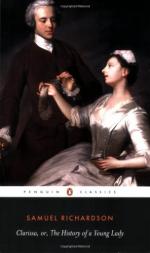So keeping don’t do, Lovelace. ’Tis not the eligible wife. ’A man must keep a woman, said the poor fellow to me, but not his estate!—Two interests!—Then, my tottering fabric!’ pointing to his emaciated carcass.
We do well to value ourselves upon our liberty, or to speak more properly, upon the liberties we take. We had need to run down matrimony as we do, and to make that state the subject of our frothy jests; when we frequently render ourselves (for this of Tom’s is not a singular case) the dupes and tools of women who generally govern us (by arts our wise heads penetrate not) more absolutely than a wife would attempt to do.
Let us consider this point a little; and that upon our own principles, as libertines, setting aside what is exacted from us by the laws of our country, and its customs; which, nevertheless, we cannot get over, till we have got over almost all moral obligations, as members of society.
In the first place, let us consider (we, who are in possession of estates by legal descent) how we should have liked to have been such naked destitute varlets, as we must have been, had our fathers been as wise as ourselves; and despised matrimony as we do—and then let us ask ourselves, If we ought not to have the same regard for our posterity, as we are glad our fathers had for theirs?
But this, perhaps, is too moral a consideration.—To proceed therefore to those considerations which will be more striking to us: How can we reasonably expect economy or frugality (or anything indeed but riot and waste) from creatures who have an interest, and must therefore have views, different from our own?
They know the uncertain tenure (our fickle humours) by which they hold: And is it to be wondered at, supposing them to be provident harlots, that they should endeavour, if they have the power, to lay up against a rainy day? or, if they have not the power, that they should squander all they can come at, when they are sure of nothing but the present hour; and when the life they live, and the sacrifices they have made, put conscience and honour out of the question?
Whereas a wife, having the same family-interest with her husband, lies not under either the same apprehensions or temptations; and has not broken through (of necessity, at least, has not) those restraints which education has fastened upon her: and if she makes a private purse, which we are told by anti-matrimonialists, all wives love to do, and has children, it goes all into the same family at the long-run.
Then as to the great article of fidelity to your bed—Are not women of family, who are well-educated, under greater restraints, than creatures, who, if they ever had reputation, sacrifice it to sordid interest, or to more sordid appetite, the moment they give it up to you? Does not the example you furnish, of having succeeded with her, give encouragement for others to attempt her likewise? For with all her blandishments, can any man be so credulous, or so vain, as to believe, that the woman he could persuade, another may not prevail upon?




